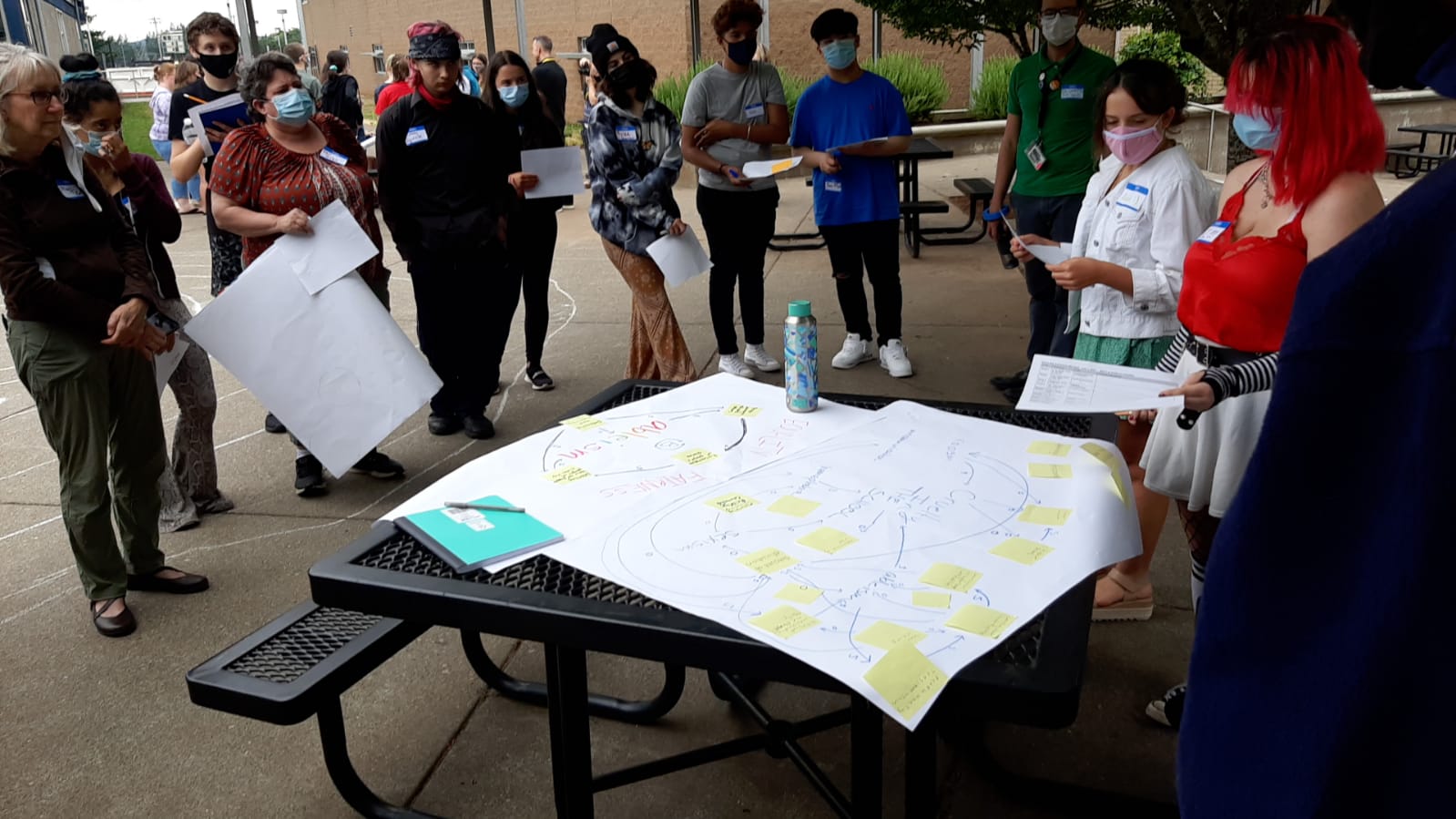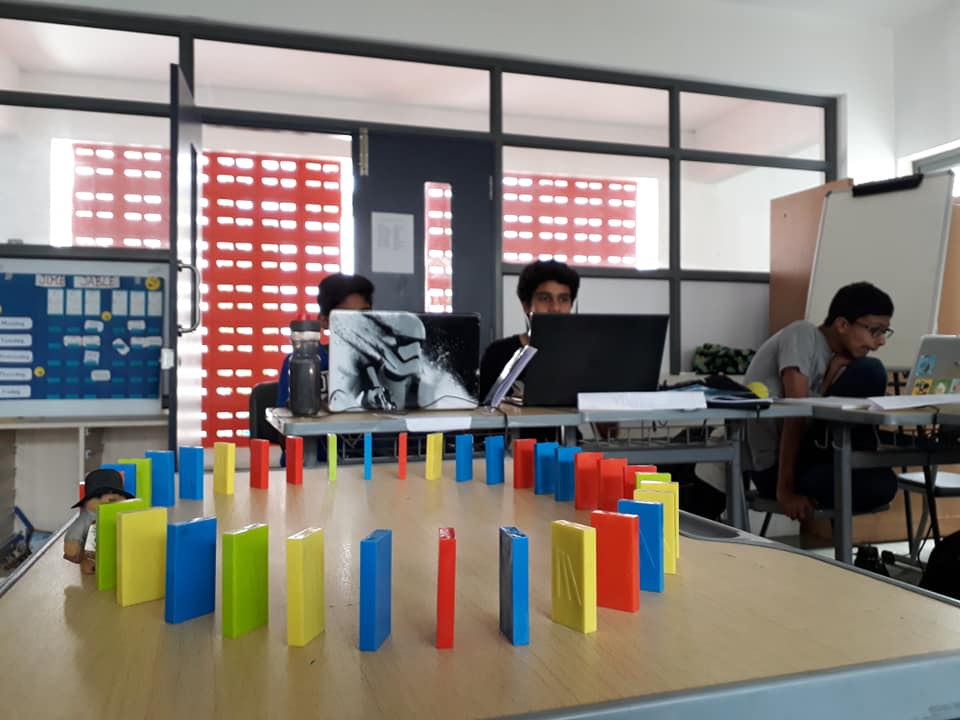
What do you see?
See the Systems is a new education initiative aimed at bringing the value of systems action to strengthen communities around the world.
**See the Systems** aims to empower young people with the tools and agency to make a real difference to their world.
# Hope
Now more than ever young people need hope. Hope based not on blindly repeating the past, but on their own ability to create their own future. Hope based on an ability to see the world with clarity and identify ways to make a positive impact. Hope based on the potential to imagine new worlds and the ways to create them together. Hope based on the power of collaboration.
See the Systems aims to equip young people with the skills and support they’ll need to be agents of change in their communities. We aim to inspire everyone to see the relationships/connections in the systems around them and to understand their power to influence these systems and to create better ones.
# Why systems?
A system is a collection of parts which interact with each other to function as a whole. Each human being is a system and we belong to other larger systems through our relationships and membership of communities, such as our family, our school and our local neighborhood.
Systems surround us and influence our behavior and our outcomes. This means that to make a difference we need to understand systems. Thus far this way of seeing the world has been the province of academics, consultants, corporations and governments. These institutions have often chosen to optimize parts of the system (their parts) at the expense of the whole. And this is the source of many of the wicked problems we now face in the world.
# Why young people?
A majority of adults are dependent on the institutions which have created these problems. It is the way the system has encouraged us to operate, to make our living, and to make our way in the world. This cannot be the way forward if we are to overcome our problems.
Young people have the ability to make a different choice. They can decide which of the existing systems they choose to support and which new systems need to be created. But only if they understand the world as a system and can *see the systems*. This is our mission at See the Systems.
# How does See the Systems work?
Young people from schools and other youth associations engage in See the Systems by forming teams with a shared focus. They identify and map systemic issues that they truly care about within their local communities. They identify systemic solutions and engage with the key stakeholders in their community to validate and implement their ideas. They evaluate the impact of their projects and share their learning with others. They incorporate what they have learnt into future exercises. They begin a lifelong commitment to seeing and interacting systemically.

Sharing proposals with community leaders
Teams are supported in their endeavors by mentors. We seek local community mentors who learn with their mentees. For example, in Bellingham we have a relationship with SCORE. At Regenerating Sonora in Arizona we have a relationship with Chris Casillas.
We can also make connections to our network of international volunteer mentors. These are experienced systems practitioners, project managers and subject matter experts from organizations such as the SDS (System Dynamics Society ![]() ), the ORS (Operational Research Society
), the ORS (Operational Research Society ![]() ) and INCOSE (International Council for Systems Engineering
) and INCOSE (International Council for Systems Engineering ![]() .) Many of them are retired business consultants and/or directors of successful businesses.
.) Many of them are retired business consultants and/or directors of successful businesses.
We encourage teams to share their learning with other young people and have a platform enabling this created and supported by Ward Cunningham and his fedwiki team.
# Our Experience
We designed and delivered two See the Systems experience weeks for 160 students (aged 14-15 years old) at **Oregon City High School**. These weeks took the students through a process whose output was a presentation of their findings, analysis, conclusions and suggested course of systemic change to a group of influential respected community members.
The teams addressed over 30 local issues of concern to them including bullying, homelessness, addiction, animal testing, street art, pollution/composting, ableism and the school curriculum. The students, teachers and community members were surprised and delighted by the potential of the program.
YOUTUBE 0IMsOh8gsLU Oregon City High School
We delivered another See the Systems experience to 56 students (aged 12-13 years old) in California with the Woolman organization and the **San Francisco Friends School**. Topics covered were wide ranging and included several on mental health.

Genwise India
Kerry has worked in schools throughout the **UK** including Kirk Balk School, Hoyland; Chapeltown Academy, Sheffield; Exeter Maths School; St Ebbe's school, Oxford and Hull & East Yorkshire Children's University. She has worked with home education groups in Hull. She has also worked with Genwise in **India** (see Passage to India) and Gimnasio Moderno and Kalapa in **Colombia**.
We would appreciate the opportunity to offer the benefit of these experiences to young people everywhere.
See the Systems is the core program in a bigger initiative we call "Relocalize Creativity". We are running our first Relocalize Creativity Workshop in the UK at the Schumacher Institute in October 2023.
# Get involved
For further information and to arrange an informal discussion please contact:
# Contact: Kerry Turner: kerry.relocalizecreativity@gmail.com (+44 7853 896127) Marc Pierson: Marc.relocalizecreativity@gmail.com (+1 360 594 2316)
# Further Information
Read more about Kerry and about Marc Pierson here.
Power of Exponential is an article about the power of mapping systems written by Kerry for teachers and parents.